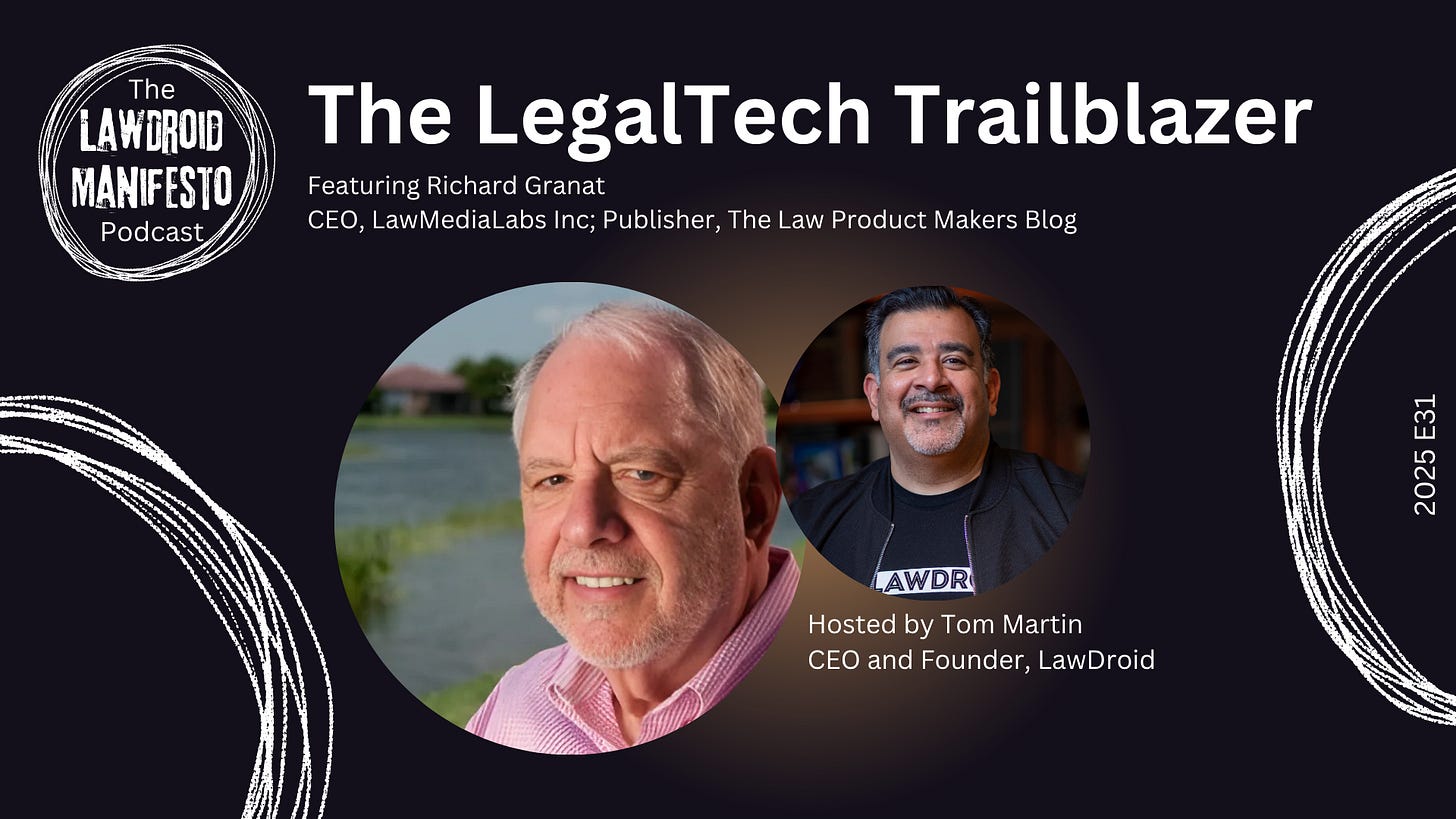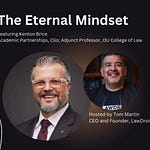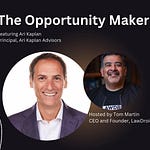Hey there Legal Rebels! 👋 I'm excited to share with you the 31st episode of the 2025 season of the LawDroid Manifesto podcast, where I will be continuing to interview key legal innovators to learn how they do what they do. I think you're going to enjoy this one!
I had the sincere pleasure of interviewing Richard Granat, who’s one of my personal innovation heroes. Richard is the real OG when it comes to using tech in legal for automation. He pioneered all of this over 20 years ago, including making it possible for lawyers to launch their own LegalZoom-like services and work remotely, and he was and is a personal inspiration to me.
So, if you want to understand how to build sustainable legal technology businesses while maintaining a commitment to democratizing access to justice, you need to listen to this episode. Richard has been at the forefront of legal innovation and launched concepts that have became foundational to the entire legal technology industry.
Transforming Legal Practice Through Decades of Innovation
Join me as I interview Richard Granat, CEO of LawMediaLabs and managing partner of Granat Legal Services.
In this insightful podcast episode, Richard shares his remarkable journey from civil rights activism in the 1960s to becoming one of the most influential pioneers in legal technology. He takes us through his experiences helping to create the nation's legal services program, founding the first automated legal forms website, and building DirectLaw, the platform that enabled solo and small firms to compete with LegalZoom. Richard also discusses his unique approach to building sustainable businesses while maintaining work-life balance and his predictions about how AI will transform the legal profession in the coming years.
His stories and insights demonstrate a lifetime commitment to making the legal system accessible to everyone, not just the upper middle class. This episode is essential viewing for anyone interested in the intersection of legal practice, technology, and social justice, offering valuable perspectives on building meaningful legal technology companies that serve the public good.
The Skinny
Richard Granat, CEO of Law Media Labs and managing partner of Granat Legal Services, shares his extraordinary journey from civil rights activism in the 1960s to becoming one of legal technology's most influential pioneers. Starting with his work helping to establish the nation's legal services program at the Office of Economic Opportunity, Richard has spent over three decades building innovative solutions to democratize access to justice. His accomplishments include creating mylawyer.com in 2001, the first legal forms website offering automated documents directly to the public, and founding DirectLaw, the first platform enabling solo and small firms to compete with LegalZoom through client-facing portals and document automation. Throughout his career, Richard has maintained a unique business philosophy focused on "making money while you sleep," building sustainable companies with small teams, and operating in "blue ocean" markets with minimal competition. He predicts that AI will significantly disrupt traditional legal services, potentially eliminating paralegal and junior associate work within three years, while core legal functions like litigation and advocacy will remain essential.
Key Takeaways:
• Richard pioneered the concept of "productized legal services" - replacing lawyer work with software to create scalable, affordable solutions
• He co-founded the Law Student Civil Rights Research Council in 1964, recruiting students from nine major law schools to support civil rights attorneys during Freedom Summer
• MyLawyer.com, launched in 2001, was the first website to offer automated legal forms directly to consumers, facing significant pushback from bar associations
• DirectLaw revolutionized legal practice by creating the first client-facing platform with cloud-based document automation and payment processing
• Richard's business philosophy centers on work-life balance, small teams, positive cash flow, and operating in uncontested market territories
• He predicts AI will eliminate traditional legal forms businesses and much paralegal work within 3-5 years
• The legal profession's core functions - litigation, advocacy, and complex client relationships - will remain intact despite technological disruption
• Richard emphasizes that lawyers must "go up the value curve" to focus on higher-value work that cannot be disintermediated by technology
Notable Quotes:
"I always wanted to make money when I sleep, which helped me with what I call my work-life balance, because even though I worked hard, the money would come in. It wasn't related to hourly billing." - Richard Granat (03:02-03:16)
"We can't have a viable legal system unless people can access the legal system." - Richard Granat (22:44-22:52)
"I always tried to be in what I call uncontested market territory, which is where nobody else was before." - Richard Granat (11:11-11:16)
"If you do searches, which I've done on ChatGPT and perplexity and a number of things, and you do a form search, give me a power of attorney. It'll retrieve for you a fillable PDF with the form." - Richard Granat (12:11-12:22)
"All of paralegal work, in my view, is going to be a large component of it. It's going to be wiped out by AI, as well as junior associate work in law firms." - Richard Granat (13:13-13:20)
"Don't quit. It's in our DNA. My son has passed it down to my son. It's straight out of the streets of New York. You don't quit." - Richard Granat (31:54-32:05)
"Our country is really based on a vibrant and independent, thriving legal profession. I don't think that's going to change." - Richard Granat (41:10-41:17)
"We had a lot of satisfaction out of running MD Family Lawyer and seeing people get through their divorce without spending thousands of dollars on legal fees." - Richard Granat (51:38-51:47)
Clips
Why Richard Predicts AI Will Erode Legal Services
Will AI Replace Paralegals and Junior Lawyers
The Curse and Blessing of Running Your Own Show
A Legal System That Works for Everyone
Richard's journey reflects the evolution of legal technology from its earliest days when bar associations viewed putting data in the cloud as radical innovation. His persistence through the dot-com bust, his ability to adapt to changing search algorithms, and his commitment to serving those who couldn't afford traditional legal services demonstrate how principled leadership can drive meaningful change in the legal profession. What's particularly striking is how he maintained his focus on access to justice while building sustainable businesses that provided him with work-life balance and financial independence.
His predictions about AI's impact on the legal profession carry particular weight given his track record of being ahead of industry trends. Having witnessed the resistance to cloud computing, online legal forms, and document automation, Richard's perspective on AI's potential to disrupt paralegal and junior associate work deserves serious consideration from legal professionals planning their careers.
Closing Thoughts
As someone who has spent years building legal technology companies, I'm continually inspired by Richard's approach to innovation. He represents a unique blend of social consciousness and business acumen that's rare in any industry. His commitment to democratizing access to justice wasn't just a marketing slogan; it was the driving force behind every company he built.
What strikes me most about Richard's story is how he consistently chose the harder path of serving underserved markets rather than simply maximizing profits. While many legal technology companies focus on enterprise clients and large law firms, Richard dedicated his career to helping solo practitioners, small firms, and consumers who couldn't afford traditional legal services.
His business philosophy of "making money while you sleep" and maintaining work-life balance offers valuable lessons for today's legal entrepreneurs. In an era where venture capital often demands rapid scaling and aggressive growth targets, Richard's approach of building sustainable businesses with small teams and positive cash flow provides an alternative model worth considering.
Looking ahead, Richard's predictions about AI's impact on the legal profession should be taken seriously. His track record of anticipating industry changes, from cloud computing to document automation, suggests we should pay attention to his warnings about disruption to paralegal and junior associate roles. At the same time, his confidence that core legal functions will remain intact provides reassurance that the profession will adapt and evolve rather than disappear.
For our Legal Rebels community, Richard's story serves as both inspiration and instruction. Innovation in legal technology isn't just about building the next unicorn startup: it's about solving real problems for real people while building sustainable businesses that can weather the inevitable storms of technological change.












